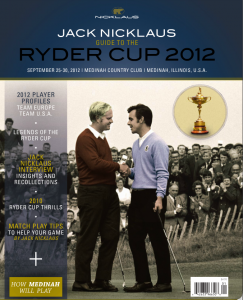by Jeff Skinner
There are few events that generate the hype that a Ryder Cup does. This week will be the most pressure packed week these twenty four golfers will see all year and maybe in their lifetime.
Few golfers have played such a critical role in the evolution the Ryder Cup as Jack Nicklaus. Walter Hagen was a significant force in the Ryder Cup in its infancy. Seve Ballesteros carried the European team to new heights during his tenure. But it may be that the greatest golfer of all time also influenced the Ryder Cup more than any single golfer in history.
Nicklaus played on six Ryder Cup teams and captained two of them but it wasn’t his record that changed the face of the Ryder Cup. It was a suggestion he made in the late seventies to the head of the British PGA that set the Ryder Cup on its path to becoming the biggest thing in golf.
It was then that Nicklaus suggested that the British team expand its membership to include all of Europe on its Ryder Cup Team. It was at that point that the European teams became more competitive and the rivalry blossomed into the behemoth that it has become.
Nicklaus has published a Guide to the 2012 Ryder Cup on his website and it is definitely worth a read. It has team profiles, and many interesting articles including an interview  with the Golden Bear where he shares many memories of the Ryder Cup.
with the Golden Bear where he shares many memories of the Ryder Cup.
If the true spirit of the Ryder Cup has been buried under tons of nationalistic rhetoric then Nicklaus is a voice of reason who would propose sportsmanship and goodwill be the order of the day. These recent Ryder Cups have crossed the line to where these tenets upon which the Ryder Cup was founded have disappeared.
Nicklaus captures his feeling towards the Ryder Cup in his welcome page of the guide. It should be required reading for every player, captain and fan of this year’s Ryder Cup.
There is no question I have loved the great game of golf since first picking up a club at age 10, but it is competition that has stirred me as much as the game itself. And there was and remains perhaps no confluence of all the elements of competition greater than the Ryder Cup.
First, there is the match play element: Every hole and every day has a conclusion, and without success, there is no tomorrow. This creates a sense of urgency that can enhance one’s focus and competitive drive. Then there is the team element: For months each season, it is not just you against a golf course and your own ability, it is you against a field of over a hundred of the world’s finest players. For one week in the Ryder Cup, you have a teammate to rely on and someone who, in turn, relies on you. Competition gives way to camaraderie.
Then, perhaps there is the most important element of all: the honor and privilege of competing for your country. This is an honor I never took lightly. Every two years, actually every year in the case of the United States competing in both the Ryder Cup and the Presidents Cup, we have an opportunity in golf to witness the spirited and unified play of 12 young men, creating a lifetime’s worth of unforgettable images. They say Tour wins are for the record books and majors are for the history books. Perhaps the Ryder Cup is for scrapbooks.
Because of all the aforementioned, I deeply cherish all six of the opportunities I had to represent the U.S. in the Ryder Cup, as well as the two times I served as captain.
My debut in 1969 at Royal Birkdale was a thrilling one for me. Little did I know, however the ending would be perhaps the most memorable aspect of the week-and one, to my surprise, people have said many years later embodies the sportsmanship that is at the heart of these competitions.
In 1979-two years after then British PGA President Lord John Derby and I discussed expanding the Great Britain & Ireland team to include all of continental Europe, and bright stars like Seve Ballesteros, to enhance the event’s competitiveness, the first U.S. vs. Europe Ryder Cup took place. Since, the Matches have not only been extremely competitive, but Europe also has a one-victory edge from 1979 through 2010.
After my first captaincy in 1983, a thrilling 1-point win at PGA National in my Florida backyard that had me so excited that I kissed Lanny Wadkins’ divot following his wedge shot to a foot an No.18, the Europeans won in 1985 for their first victory in 28 years. I was then asked to return as Captain in 1987 when the Ryder Cup was being played at my Ohio home course of Muirfield Village Golf Club. With expectations and emotions high, my team played its heart out but we suffered a 2-point loss. Well, suffered is a harsh word. While it was the first European win on U.S. soil, it was probably the best thing that ever happened to the Ryder Cup and its future. I think I was perhaps best equipped to handle such a loss, especially given my attitude over the years toward the Ryder Cup.
As a player and captain, I have maintained a consistent position regarding the competitive spirit of the Ryder Cup. While firmly founded on competition, we can never forget that these matches should always be conducted with utmost sportsmanship and for the singular purpose of international goodwill and growing the game I love.
Click here for Jack’s Guide to the 2012 Ryder Cup.
